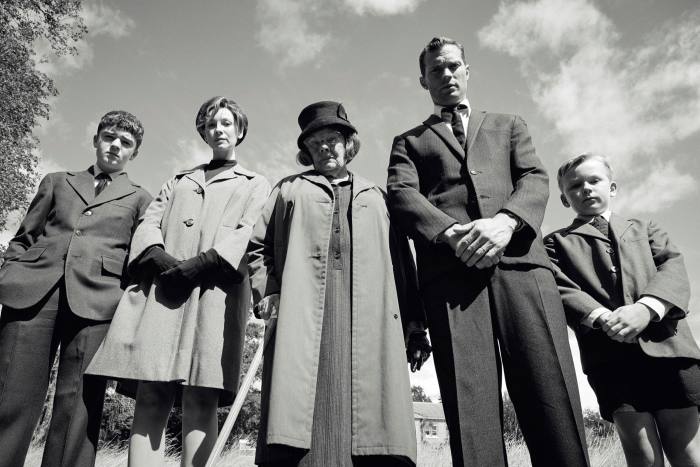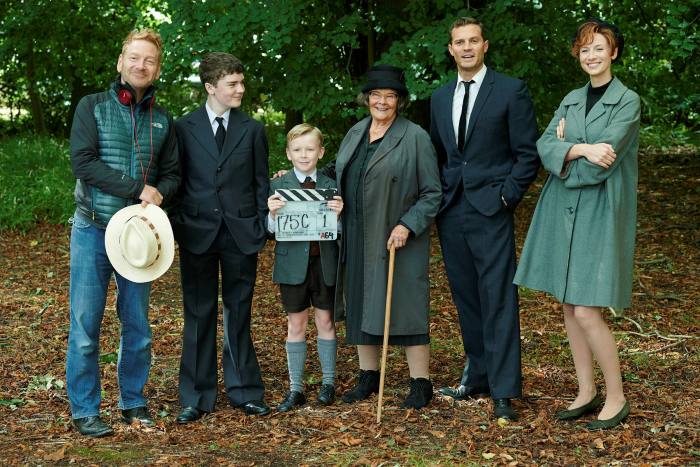Judi Dench and Kenneth Branagh on good times, bad times and Belfast
Judi Dench spent a lot of time on TikTok during the first UK lockdown in early 2020, tutored by her grandson and performing hand-jivey dance routines. It would not be her last performance of that year. In the autumn, she travelled to Northern Ireland to act in the coming-of-age drama Belfast. This time her director was Kenneth Branagh. His lockdown had been spent writing the script, a highly personal tale of a young Ulster boy set in 1969, when the Troubles flared into a 30-year tragedy.
Last September, the film premiered to acclaim at the Telluride Film Festival in Colorado. More festival triumphs followed for the rest of 2021 in Toronto, Rome, London and Rio. Now Belfast has become the bookmakers’ favourite to win Best Picture at the Oscars in March and has seven nominations for this weekend’s Golden Globes.
Yet the long stretches of Covid limbo in between have left both Dench and Branagh disoriented. Even this joint interview in central London feels strange, they confess. “My rhythms have gone,” Dench says. “I tell myself, ‘That’s because you’re in your eighties, you stupid old person.’ [She is 87]. But actually, lots of people are wobbling.”

Branagh, 61, nods energetically. “We’ve had so much uncertainty, all our emotions are right at the surface. I feel bizarrely close to tears a lot now. I said this to Jude only yesterday.”
To each other, Branagh and Dench are Ken and Jude. Their dynamic has the easy double-act bounce of performers at play — and longstanding colleagues. “Too long,” Dench says. Branagh dates their first meeting to 1985 and a glum BBC rehearsal studio nicknamed the North Acton Hilton. “I was 24. I still remember Jude sweeping in, very swish in high suede boots.” (Dench disputes the verb: “I’ve never swept in anywhere.”)
The production was a TV adaptation of Ghosts by Ibsen (to whom, coincidentally, Dench recently discovered, she is distantly related). She recalls a tale from the set. The director had gathered his cast for a near-silent rehearsal exercise, in line with the play’s grim overtones of syphilitic madness. Moments passed. Then another actor, Michael Gambon, made a deadpan joke about potatoes. “Ken and I went to pieces. Just howling. Neither of us could stop. It was the tension. Until a voice came over the loudspeaker and said ‘Miss Dench and Mr Branagh, you may leave.’ We were literally sent home.”
Even so, there were lessons to be learnt. As Branagh remembers it, “Ghosts was the first time I saw Jude in the last moments before a scene. She is like an Olympic athlete. Just this utter laser focus. I thought ‘Jesus Christ, Ken, forget Michael Gambon’s potatoes, you’ll do well to keep up here.’”

Such is their bond. “We’ve worked together 12 times since,” Dench notes, their collaborations including 2017’s Murder on the Orient Express, multiple Shakespeares and playing the Bard and his wife in the 2018 film All Is True. Branagh was already a rising star when they made Ghosts. By 1988, at still only 27, he was directing Dench in his film of Henry V. It won him Oscar nominations as Best Actor and Best Director.
Belfast goes back even further, both social history piece and Branagh origin story. Not everything in it is autobiography; the greater parts are. Like the unnamed family at its centre, his own were Protestants in a Catholic nook within a wider Loyalist enclave as sectarian riots engulfed the city in August 1969. In the movie, the parents of the young hero, Buddy, debate leaving for England. In reality, the Branaghs quit Northern Ireland after the riots. Their middle child was nine when they settled in suburban Reading, 20 miles west of London, young enough to quickly lose his accent. Adult acquaintances have long been surprised to learn he is as much a son of Belfast as George Best or Van Morrison (who wrote the film’s score).
Branagh draws winning performances from his cast: scampish newcomer Jude Hill is his alter-ego; Jamie Dornan and Caitriona Balfe the parents. Dench plays the grandmother, a kitchen-apron matriarch. (“Like Buddha,” Branagh says.) She has fewer actual lines than the other leads. She also makes the whole movie work. The final shot is Dench, a wordless close-up, brilliantly articulate. “I don’t feel in any way that I’m key to the film,” she says with feeling. But the moment reminds you of the complex figure behind the cosy British “national treasure” she is often simplified into: a mischief-maker who once bestrode London in high suede boots (“I should have worn them today”); a Quaker; a precision talent.
For all the proprietary claims made on her by the British media, part of the real Judi Dench remains hers alone. “I don’t want to go into the business of being a Quaker, but it does give you a private, quiet centre.” She gestures to herself and laughs. “Whatever anyone may think of this fluttery thing on the outside.”


When the Belfast riots broke out in 1969, Dench was already a theatrical star. She was also conscious of the looming Troubles. Like Branagh, she is less an icon of Englishness than is sometimes assumed. Her mother was a Dubliner. “Ma was still alive in 1969 and we had relatives in Belfast, so we were very aware of what was happening. When the British troops went in, it was like the start of Covid — people felt it would all be over in three weeks. But I don’t know that I ever thought that.”
I ask them both if they are optimistic about peace in Northern Ireland now. Branagh gives a long, heartfelt answer, citing the need to bequeath hope to new generations, lauding the “imperfect miracle” of the Good Friday Agreement, the collective resistance to violence among ordinary people. Dench glances up. “I want to be,” she says.
When she isn’t speaking, Dench sometimes gazes at the floor. She disclosed in 2012 that she was experiencing macular degeneration — the sight loss condition that makes it impossible, for instance, to recognise faces. For some time, she has had to have scripts read to her. So it was with Belfast. Branagh started writing early in the pandemic — reminded, he says, of finite time and aware “there was a story to be told”. His grandmother was transposed from real life as linchpin of the fictional family, and he always wanted Dench to play her. “I hoped something here would frighten Jude. Because she likes to be frightened into playing a character.”
Is this true? “Oh, I’m always fearful,” Dench says. “I used to joke when I was doing plays at the Old Vic in my twenties that this was the one where I was going to be rumbled.” After so many fine performances, what is she afraid of? “Not doing the thing justice.”

Beyond humour, you sense what really brings her and Branagh together is perfectionism. For Dench, helping a pal make his movie also offered the chance to work with the kind of director she values, “One who tells you to do it better — and Ken can tell you how with a word.”
There was also the simple appeal of a job. In lockdown, Dench found her work ethic nagging at her, without any actual work to occupy it. “I kept thinking: ‘I ought to learn the sonnets.’ Have I learned the sonnets? I have not.” Belfast, she says, was a godsend. “We were all in masks, and because I can’t see now, I was forever starting conversations with the wrong person. But to be part of a unit again — oh, the relief.”
While shooting in 2020 meant frequent tests and colour-coded walkways, a counterintuitive joie de vivre also kicked in. “Precisely because there was such care taken, it meant Covid wasn’t the first thing you thought about.”
Often filming with a skeleton crew, Branagh says making Belfast could feel like friends shooting the breeze. “In fact, we had to spend a lot of money on Covid protocols to achieve that. But it felt appropriate, because the film is about the fragility of community and enjoying the good times. And we were a fragile community, doing just that.”
Now Branagh’s small, personal movie is an awards season heavyweight. Yet despite 40 years of fame, his life away from the camera has been largely kept out of sight. You wonder if he feels exposed now, with something so much like his childhood in front of audiences and Oscar voters. “I’m not a very public person. So it does feel vulnerable-making. But I always felt this story could reach beyond the narrow confines of me.”
In cinemas in the UK and Ireland from January 21 and in US cinemas now
Follow @ftweekend on Twitter to find out about our latest stories first
For all the latest Business News Click Here
For the latest news and updates, follow us on Google News.
